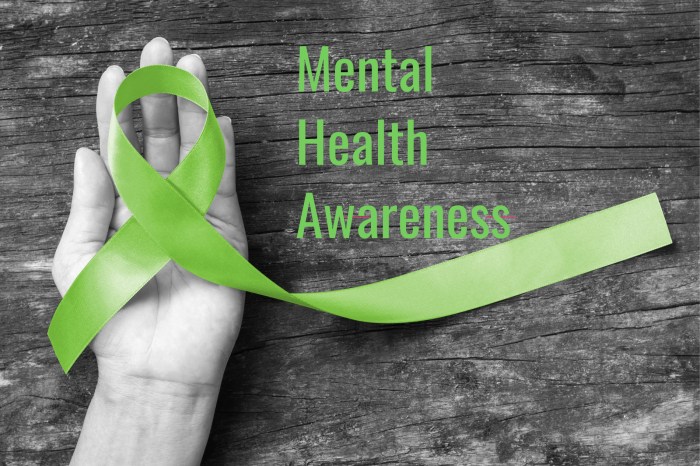Mental Health Awareness kicks off a journey into understanding the importance of breaking stigma and fostering support for mental health in society. From impactful campaigns to cultural influences, this topic delves deep into the heart of the matter, shedding light on a crucial yet often overlooked aspect of well-being.
As we navigate through different strategies and initiatives, the conversation around mental health transforms into a powerful force for change, inspiring communities to come together and embrace a more inclusive understanding of well-being.
Importance of Mental Health Awareness
Mental health awareness is crucial in society as it helps to break down the stigma surrounding mental health issues and encourages individuals to seek help and support when needed.
Impact of Raising Awareness
- Increased understanding and empathy towards those struggling with mental health challenges.
- More resources and support available for individuals in need.
- Empowerment for individuals to speak up about their mental health and seek treatment.
Reducing Stigma
- By increasing awareness, society can break down stereotypes and misconceptions about mental health.
- Encourages open conversations and normalizes seeking help for mental health concerns.
- Helps individuals feel more comfortable reaching out for support without fear of judgment.
Initiatives for Mental Health Awareness

Creating awareness about mental health is crucial to breaking the stigma and providing support to those in need. Various initiatives have been successful in spreading awareness and encouraging conversations about mental health.
Examples of Successful Mental Health Awareness Campaigns
- The “It’s Okay to Not Be Okay” campaign by the National Alliance on Mental Illness (NAMI) aimed to normalize discussions around mental health struggles and provide resources for those in need.
- The “Bell Let’s Talk” campaign in Canada used social media to raise funds for mental health initiatives and encouraged individuals to share their personal experiences with mental health.
- The “You Are Not Alone” campaign by the American Foundation for Suicide Prevention focused on suicide prevention and offered support to individuals struggling with suicidal thoughts.
Role of Social Media in Promoting Mental Health Awareness
Social media plays a significant role in promoting mental health awareness by providing a platform for individuals to share their stories, resources, and support. Platforms like Instagram, Twitter, and Facebook have been used to spread positive messages, offer helplines, and connect individuals with mental health professionals.
Schools and Workplaces Contribution to Mental Health Awareness
- Schools can promote mental health awareness by incorporating mental health education into their curriculum, providing access to counselors and support groups, and organizing workshops and events focused on mental well-being.
- Workplaces can contribute to mental health awareness by creating a supportive work environment, offering mental health resources and programs, training managers and employees on mental health first aid, and implementing policies that prioritize mental well-being.
Strategies for Improving Mental Health Awareness
Improving mental health awareness is crucial in creating a supportive and understanding community. Education plays a vital role in shaping people’s perspectives and breaking down stigmas surrounding mental health issues. Storytelling can be a powerful tool in connecting with others, fostering empathy, and encouraging open conversations. Engaging different communities in mental health discussions is key to reaching a wider audience and promoting acceptance and support.
The Importance of Education in Mental Health Awareness
Education is essential in dispelling myths and misconceptions about mental health. By providing accurate information and raising awareness about common mental health conditions, we can help individuals recognize the signs and seek appropriate help. Schools, workplaces, and community organizations can play a significant role in educating people about mental health and promoting a culture of understanding and acceptance.
Utilizing Storytelling as a Powerful Tool
Storytelling allows individuals to share their experiences and struggles, making mental health issues more relatable and humanizing. Personal narratives can inspire others to speak up, seek help, and feel less alone in their journey. Through storytelling platforms such as social media, podcasts, and community events, we can amplify diverse voices and create a supportive environment for mental health conversations.
Engaging Different Communities in Mental Health Dialogues
Each community has its unique challenges and cultural beliefs around mental health. To engage diverse groups effectively, it is essential to tailor awareness campaigns and initiatives to their specific needs. Collaborating with local leaders, influencers, and organizations can help bridge gaps and promote inclusivity in mental health discussions. By creating safe spaces for open conversations and providing resources in multiple languages, we can ensure that everyone feels seen, heard, and supported in their mental health journey.
Impact of Cultural Differences on Mental Health Awareness

Cultural beliefs play a significant role in shaping attitudes towards mental health. Different cultures may have varying perspectives on mental health conditions, which can impact how individuals seek help or perceive mental health awareness efforts.
Influence of Cultural Beliefs on Mental Health
- Some cultures may stigmatize mental health issues, viewing them as a sign of weakness or moral failing.
- Others may attribute mental health conditions to supernatural causes, leading to reliance on traditional healing practices.
- Cultural norms around emotional expression and help-seeking behavior can also influence how mental health is perceived within a community.
Challenges in Raising Mental Health Awareness in Diverse Communities
- Lack of culturally sensitive resources and services can hinder outreach efforts in diverse communities.
- Language barriers may make it difficult to communicate effectively about mental health across cultural lines.
- Misunderstandings or misinterpretations of mental health concepts can arise due to cultural differences.
Strategies for Promoting Mental Health Awareness while Respecting Cultural Differences
- Collaborate with community leaders and organizations to ensure mental health initiatives are culturally appropriate.
- Provide education and training on mental health that is tailored to the cultural beliefs and practices of specific communities.
- Engage in open dialogue and actively listen to the perspectives of individuals from diverse cultural backgrounds.
